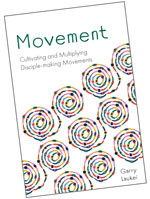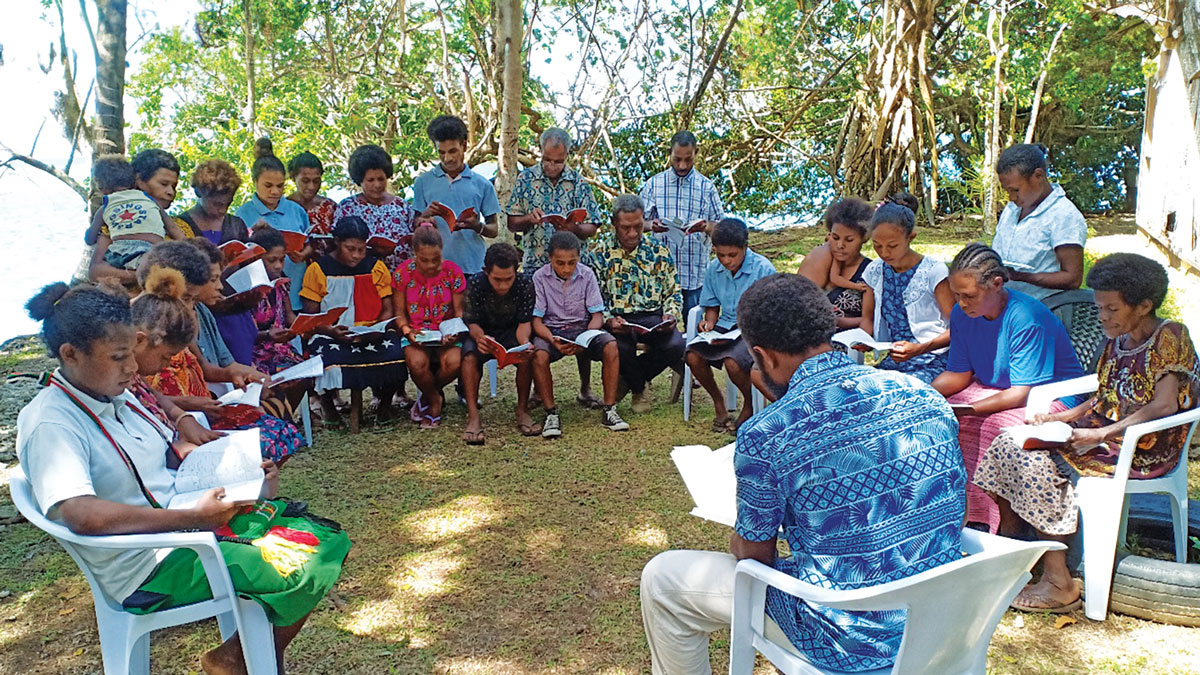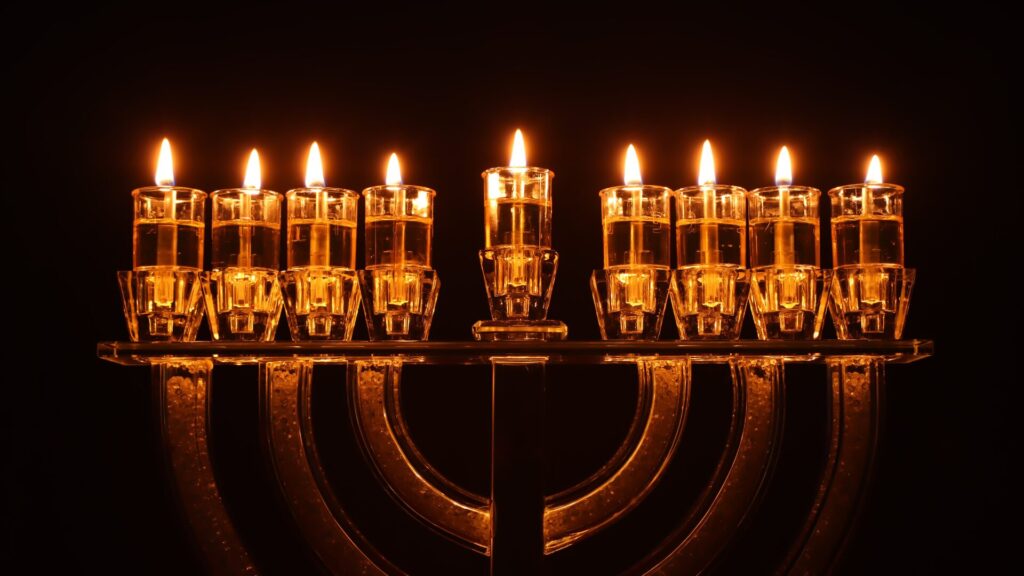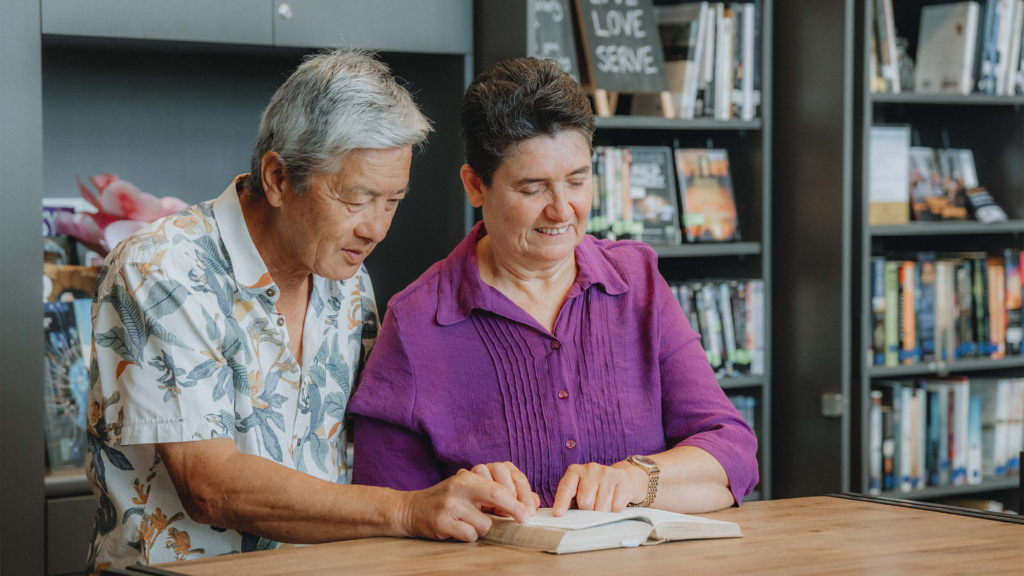When Discovery Bible Reading was introduced to Papua New Guinea, we did not realise how it would impact our churches, nor how this simple process would be used by the Holy Spirit to empower members and pastors to share faith, help new people find the truth about Jesus and result in the planting of many new churches. I have seen how effective it is and continue to facilitate Discovery Bible Reading groups—and find it is the best method for sharing the Bible’s message.
In the Pacific we love to witness to our friends and communities, in our language groups, villages, towns and cities. We look for the best ways to do this—using Bible studies, cottage meetings, visitor and welcome days in our churches, together with evangelistic meetings. Most of these are the methods pastors and some of the elders can use, to cover many topics to influence people to accept our beliefs and join the Adventist Church.
However, these methods often given little opportunity for questions to be explored and answered, with the messages of truth not really reaching into the hearts and minds of the people. Sometimes preachers speak from a stage for weeks with little or no personal interaction. In contrast, I was especially fascinated when Discovery Bible Reading was introduced to us in 2018.
Discovery Bible Reading allows people to read the Bible for themselves, ask questions, and find answers as they read and discuss. It reminds me of the story of the Ethiopian eunuch in Acts 8:26-40. Philip was taken by an angel to the desert road leading from Jerusalem to Gaza. There he met this important treasury official from Ethiopia—a eunuch. He had been to Jerusalem to worship and on his return was reading Isaiah’s prophecy of “the suffering servant”:
“He was led like a sheep to the slaughter, and as a lamb before the shearers is silent, so he did not open his mouth. In his humiliation he was deprived of justice. Who can speak of his descendants? For his life was taken away from the earth” (Acts 8:32, 33; cf. Isaiah 53:7, 8).
In reading this prophecy he discovered something new and surprising—and something he did not understand. Was Isaiah writing of himself, or someone else? Philip ran to the chariot, asking, “Do you understand what you are reading?” (Acts 8:30), and the Ethiopian invited him onto the chariot. Together they explored the scriptures—like a Discovery Bible Reading in which the group, after reading the story ask: (1) What is new? (2) What surprises us? and (3) What do we not understand?
“Then Philip began with that very passage of Scripture and told [the Ethiopian] the good news about Jesus” (Acts 8:35). Philip led him to see that on the cross Jesus gave His life for all humanity. He is the Lamb!
Convicted and convinced, the Ethiopian was challenged by the next question of Discovery Bible Reading: (4) What will we obey or apply to our lives? and he requested baptism. “Why shouldn’t I be baptised?” he asked (Acts 8:36).
This is what Discovery Bible Reading is all about. It allows people to read for themselves to discover truths. It challenges people to think—and participate, ask questions, seek answers and make lasting decisions. As with the Ethiopian eunuch, Discovery Bible Reading leads people to rejoice in the truth they discover about Jesus, the Lamb of God. And every Discovery Bible Reading group has the potential to lead others to rejoice in the truth about God.
The final question encourages each participant to be a disciple-maker: (5) What will we share with another this week? And it is well known that the Ethiopian took the gospel to his people, creating the first missionary movement in Africa.
Discovery Bible Reading is a new and fresh method of discipling new people to be rooted in Jesus Christ, and one that has a perpetual significance. Many churches have been planted as the result of this method of making disciples. A new permanent church building in Port Moresby, our national capital, has been named “Discovery Bible Reading Church”—the result of this method. It is very effective, and although many in Papua New Guinea are still yet to embrace Discovery Bible Reading, the outcome we are seeing right now is exhilarating. God is at work, the Holy Spirit is bringing change to people’s lives, many members are sharing faith this way, people are being baptised, new churches are being built and people are worshipping God on His Sabbath.
Today this method is being used across the Pacific. I was serving in the Madang Manus Mission when I first learned about Discovery Bible Reading and immediately began to use it and to teach others to as well. Now in the New Britain New Ireland Mission as a chaplain, I am using it on university and institutional campuses, and in local churches. When first introduced many thought it would take away from the pastor or minister being the main teacher or preacher and break the church. But today we benefit from Discovery Bible Reading groups, which are growing into new church plants with more members added to the Church.
So here is my challenge to all leaders, pastors, elders and members of the Adventist Church in the Pacific. Don’t settle with just doing what we have always done in the past, with just one person talking for the whole duration of a Bible study—which can also result in disputes and disagreements when people want to defend their beliefs and their churches.
Rather, let people discover for themselves. Times have changed. Many in our churches and communities are well educated. Give them the opportunity to give their honest thoughts on the text, ask questions and discuss the text together to absorb its truths. Discovery Bible Reading is a simple, anyone-can-do-it, no cost process in which people discover and receive the gospel and Bible truths themselves. And when they discover the truth themselves, they experience genuine lasting change.

The book Movement: Cultivating and Multiplying Disciple-making Movements, written by Garry Laukei, and available from Adventist Book Centres and online, details more about what Pastor Laukei has learned.
Garry Laukei is the chaplain at the University of Natural Resources and Environment, Correctional Institutional Services, and Kerevat School of Excellence in Rabaul, East New Britain Province.






